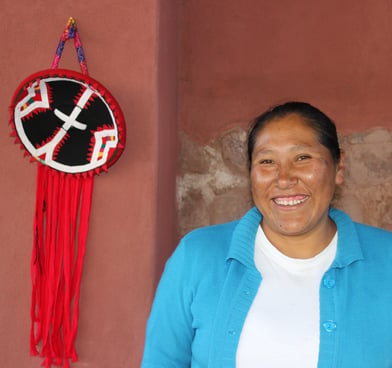Fresh Perspective On Sustainable Travel Yields Inspiring Results for Indigenous Women
Given the persistent global issues of climate change and marginalization of the poor, it's no wonder that the notion of vacations that actually benefit women (like Luisa Quispe shown above) is met with slight skepticism.
SUSTAINABILITY (POST) PANDEMIC HOSPITALITY
After all, we experience vacations so that we can escape from our own day-to-day routines and troubles. The idea of applying one's travel "bucket list" as a tool for local community development and enrichment seems downright utopian.However, early results from an innovative new program managed by the Inter-American Development Bank (IDB) indicate that a private-public sustainable tourism approach to community development yields a win-win solution in the form of better local employment opportunities, increased standards of living and increased childhood education prospects as well as more authentic experiences for visitors.
New IDB Approach Views Tourism With Consumer Eyes
It seems like such a simple idea -- use sustainable tourism as a tool for community development. But, for the IDB, the concept had been beset by failures due to developing tourism products (including hotels, restaurants, activities, etc.) based on an if you build it, they will come! mentality rather than a what do travelers really want in an experience? approach. The former resulted in a constant scramble to find customers while the latter focuses on a community's social and economic results. With this new approach, the Multilateral Investment Fund (MIF) of the IDB announced a $1 million partnership with Canadian-based sustainable tourism company, G Adventures, and its non-profit Planeterra Foundation last year so that they could bring their collective marketing prowess, travel product expertise, and world-wide clientele to rural villages in four countries, namely Peru, Costa Rica, Guatemala and Nicaragua. The goals were to benefit rural communities traditionally excluded from tourism, to develop new authentic experiences for the tourism industry and to establish a model of tourism development involving the private sector. ~ Kelly Galaski, Program & Operations Manager for the Planeterra Americas Region and the Technical Director for the MIF/IDB ProjectOne such example of an experience that has been added to the portfolio is the opening of the Sacred Valley Community Restaurant along the Sacred Valley Trail toward Machu Picchu in Peru. While the Inca Trail has been quite popular with travelers, overcrowding has enabled the development of the Sacred Valley Trail as a good alternative. Before the MIF project, the Huchuy Qosco community of 60 families along the Sacred Valley Trail was effectively excluded from tourism opportunities due to a lack of market knowledge and product offerings. However, in the last year, the community has received funding and training to develop the farm-to-table restaurant and expand five home-stay visitor programs, therein establishing partnerships with as many family businesses as possible. This year, the Sacred Valley Restaurant is expected to receive approximately 15,000 - 20,000 guests and it has changed the livelihood of many residents including Hilda Nina Inquiltupa, a 37-year-old wife and mother of 5 children from the Saqllo community (pictured below), who explains how her initial trepidation led to hope for the future.

Before, I was dedicated to the chores of my household and to taking care of my children (since) the only person who worked was my husband...Very infrequently, I had small temporary jobs that the local government provided, for example road work or other small construction jobs that last(ed) for two or three months. My expectations (for this restaurant) were somewhat negative because previously I had training with other institutions and projects to provide tourism services and rarely did I ever have any guests...I thought this idea would be the same. But, with time, I realized that this new project was different...I've received training in restaurant (cooking and) operations and (I'm hoping to learn) basic English...(there are) many positive aspects and I realized that this was the opportunity that myself and my community were waiting for. It motivated me and I began to motivate my other friends too... I would like to educate my children, I'd like them to reach secondary school or university and I think that's possible now with the salary I'll be earning in the restaurant. I truly believe that the project has changed my job opportunities, is helping me contribute to the family's income, is helping to improve my household, and reach my dreams of being able to educate my children. ~ Hilda Nina InquiltupaSustainable Tourism Projects Are Empowering Women Vacations have an unmistakable power to bring joy, make dreams come true, and increase self-confidence - for both the traveler and, when tourism is done properly, the individual community members. For example, when 45-year-old Marta Guerrero - having only completed a sixth grade education in Costa Rica -- established Naturtico, which is her own line of natural organic and biodegradable beauty products, her self-confidence soared.

